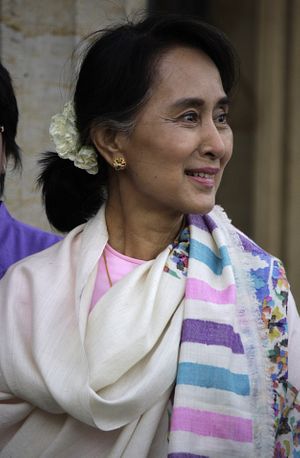While Aung San Suu Kyi’s inauguration as Myanmar’s state counsellor early last month was largely academic, it certainly wasn’t short on significance. With the globally revered democracy icon vowing to be “above the president” anyway, the international community is now queuing up to engage with the once pariah state.
But though Suu Kyi’s ‘brand’ has the power to attract rapid change for the nation, it could also quickly become Myanmar’s Achilles heel.
U.S. business delegations are expected to arrive in the country shortly to assess investment opportunities, says Scot Marciel, the new U.S. ambassador to Myanmar, also known as Burma. And on May 3, Japanese Foreign Minister Fumio Kishida met with Suu Kyi as he reportedly weighs a development assistance offering worth $910 million. These visits follow the early-bird brigades of China, Italy, Germany, and Canada, which have already held talks with the new government since it came to office on March 30, according to The Myanmar Times.
Whether for business gains or foreign policy leverage, Myanmar—sandwiched between the Indian and Chinese economic powerhouses—is prime real estate.
But in a country severely lacking in institutional capacity, “the tsunami of aid” may actually hinder Myanmar’s transition says Lex Rieffel, an expert on Southeast Asia at the Brookings Institution, a U.S. think-tank. Foreign donors absorb precious ministerial time in coordination visits; they also hire the most qualified local citizens and drive up property prices in Yangon, the country’s largest city, says Rieffel.
Untamed foreign direct investment can be equally insidious by competing with domestic industries through unethical business practices or by feeding corrupt hands, particularly in the nation’s elite-tied gas, jade, and timber resource extraction industries.
Meanwhile, a rapid influx of aid also goes against the new government’s vision. National League for Democracy leader Suu Kyi (also the foreign minister) and proxy president cum long-time friend, Htin Kyaw, do not seek “abrupt changes” and have outlined, though vaguely, phases for Myanmar’s economic transition.
The Nobel Peace Prize winner wishes to lay out her own unique economic vision. During a 2013 visit to Singapore Suu Kyi stopped short of suggesting Myanmar should follow in the footsteps of free-market capitalism’s model student. “Perhaps Singapore could learn from us a more relaxed way of life,” she said at the time.
And the NLD’s 2015 election manifesto is also littered with ‘Suu Kyi-isms.’ It seeks to lift FDI but only with the “highest international standards” that can bring “sustainable long term mutual benefits.” The five economic pillars—fiscal prudence, efficient bureaucracy, agriculture, monetary and fiscal stability, and infrastructure—are considered necessary groundwork before global financial flows accelerate the nation’s growth.
The party, which won 80 percent of available seats in the November elections, wants to achieve a “controlled opening,”avoiding the asset bubbles, income inequality, corruption, and international risk exposures befalling some of its Asian neighbors.
For some, that ship has already sailed. Unanchored by the reforms under former president Thein Sein, which led to a tapering in international sanctions, Myanmar’s economy is expected to grow at a breakneck 8.4 percent this year, according to the Asian Development Bank’s latest outlook report—the highest in Asia. Meanwhile, FDI rose to a record $9.4 billion in the 2015-16 fiscal year.
And according to the local Daily Eleven newspaper, the country projects a cumulative $140 billion in FDI through 2030, assuming the United States restores the generalized system of preferences and lifts remaining sanctions.
But Suu Kyi needs time to assemble an able bureaucracy to implement the laws and regulations to manage incoming funds. Otherwise, the new funds may be destined to circulate among the corrupt—bypassing the 26 percent of the population below the poverty line.
She also faces the small tasks of negotiating governance terms with the military, forging peace deals with warring ethnic groups, and weighing controversial large-scale construction projects like the currently shelved $3.6 billion China-led Myitsone dam.
Myanmar’s economic sustainability is already at stake, before it has even taken off. As one poetic Yangon resident put it, “The foundations needs to be laid, and the cement needs to dry first before Myanmar can dream of building further.”
Tej Parikh recently received his master’s degree from Yale University, with a focus on state building, ethnic conflict, and fragile states. He has written for the Guardian, Reuters, The Cambodia Daily, The Diplomat and Global Politics Magazine. He tweets at @tejparikh90.

































